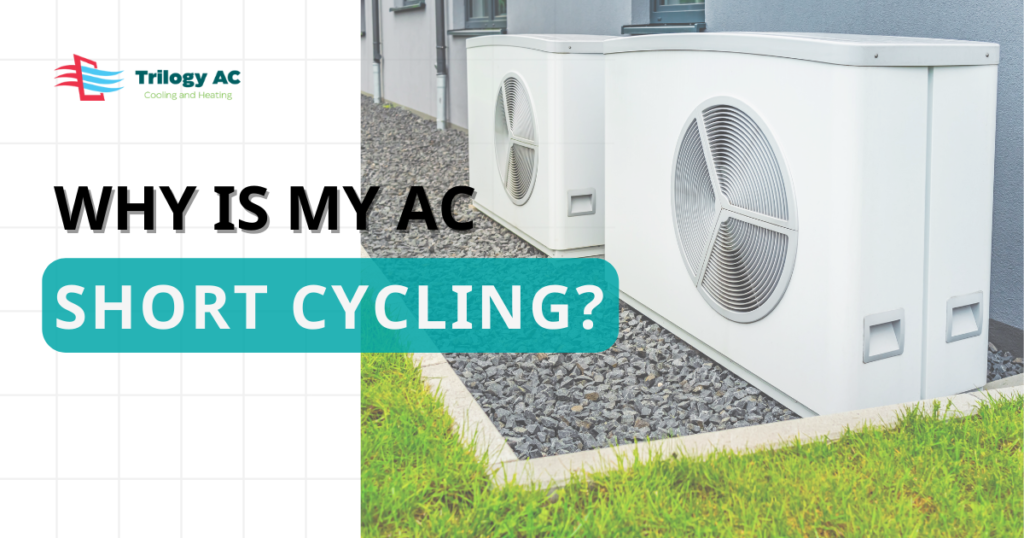An AC short cycling is a significant issue that’s often overlooked. It can happen for many reasons. Normally, your air conditioner should run for about 10 minutes, turn off for 10 minutes, and repeat, equating to around three cooling cycles per hour. If the compressor turns on and off more frequently, it might not seem alarming, but it limits your AC system’s cooling ability and increases wear, leading to an urgent need for professional air conditioning services.
Most Common Reasons for an AC Short Cycling
Short cycling also causes your air conditioner to use more electricity. Operating costs can increase due to higher energy bills on top of the potential for major repairs if the underlying issue isn’t fixed. The reasons your AC may be running in shorter cycles include the following:
- Clogged Air Filter: A dirty or clogged filter is one of the most common reasons for an AC short cycling. Fortunately, it’s also the easiest to address. Cleaning or changing the filter, depending on the type and model, should resolve the problem. If your AC keeps shutting off, it should be the first place to look.
An AC filter traps airborne contaminants. When it fills up, particulates can get into the system and disrupt its performance. However, the biggest impact of a clogged filter is reduced airflow, which can cause the unit to overheat and turn off until it cools down. Changing the filter every month or two can avoid short cycling.
- Malfunctioning Thermostat: If the thermostat isn’t reading the temperature correctly, your AC unit may seem to turn on and off randomly. An incorrect reading causes the controller to “think” the set temperature has been reached, so it shuts the system down. This can be caused by a battery, mechanical, or electrical issue, but incorrect placement can also play a role, especially if the thermostat is in direct sunlight or near a vent or heat-producing appliance.
To prevent a thermostat issue from causing your AC to short cycle:
- Place it in a centralized area, away from doors and windows.
- Install the unit where temperatures are average for your home.
- Change the batteries as recommended.
- Call an HVAC technician if the unit malfunctions.
- Schedule annual maintenance to calibrate the thermostat and correct potential issues early.
- Have a professional relocate the thermostat.
- Refrigerant Leak: An AC short cycling can be caused by a low refrigerant level. The refrigerant circulates through copper lines and the evaporator and condenser coils to remove heat from the air in your home. If there’s not enough of it, your air conditioner must work harder, which can cause it to keep turning off. It will also run more frequently, which uses more energy and increases the rate of wear.
Refrigerant is a hazardous substance that can harm the environment. If your older AC uses R-22, Freon can contribute to ozone layer depletion. A refrigerant leak is not only bad for your AC and the environment, it is also a health hazard if inhaled; signs of refrigerant poisoning include:
- Headaches
- Dizziness
- Nausea
- Coughing
- Shortness of breath
- Irregular heartbeat
- Seizures
- Loss of consciousness
Also, even small amounts of vapor can trigger eye irritation. Direct contact with refrigerant can result in skin irritation. If there are other signs of a leak, such as a lack of cooling or hissing or gurgling sounds from your AC, call a repair company right away to fix it.
- Frozen Evaporator Coil: Various issues may cause the evaporator coil to freeze. It’s where the cold refrigerant flows and absorbs heat from the warm air that’s blown over it, allowing your AC to cool your home. When the evaporator coil freezes, your air conditioner can overheat. The system shuts down to cool off; once it does, it will turn on again, causing what we recognize as short cycling.
If this is the first time you have a frozen evaporator coil, turn the system off for 24 hours or run it in fan-only mode. The coil should defrost. To avoid a flood or water damage, place a pail or bucket under the coil to catch water from melting ice. Call a professional if the coil freezes again soon after or your AC continues to short cycle.
- An Electrical Issue: An AC that’s short cycling may have an electrical issue. A loose connection, corroded contact, faulty wire, or bad capacitor or other electrical component can cause your AC to malfunction. Therefore, short cycling may be due to a lack of power or an unsteady supply of electricity.
Only a licensed HVAC technician should address an electrical problem. Trying to troubleshoot and solve it yourself can result in more damage or an electric shock, burn, or other injury. Consider it an immediate safety hazard and call for help.
- Bad Low-Pressure Control Switch: This switch turns the system off if the refrigerant pressure drops too low. It can trip with even a small pressure difference. In some cases, temperature changes with the seasons can cause a pressure fluctuation, so the sensitive switch will shut the system down. However, if the low-pressure control switch malfunctions, the unit may short-cycle. It could also overheat, which can lead to a breakdown.
- Oversized or Undersized AC: If the unit is too small or too large for your home, you may deal with a short-cycling AC. This is one reason an HVAC professional should carefully evaluate your home’s cooling needs before installation. Too small a unit will work harder to cool your home. It can then overheat and shut off prematurely. Too large a system will cool the space too fast, so cooling cycles will be shorter and the unit will turn on and off more frequently.
- Failing Compressor: If the compressor is overheating, damaged, or near the end of its lifespan, it can cause your AC system to short cycle. Compressor replacement may be possible if a component matching your system can be found. Since this is one of the more costly AC repairs and compressor failure often occurs as other components are aging, replacing the entire system is often more cost-effective.
How to Prevent an AC from Short Cycling
You can reduce the risk of AC short cycling by having it properly sized before installation. A professional installer will consider the square footage of your home, how many windows there are, ceiling heights, shading, and which rooms get direct sunlight. Using a precise calculation, they can choose the right-sized AC for your home and identify models with the ideal specifications.
While you can prevent short cycling before the unit is installed, there are steps to take throughout the system’s life to ensure it cycles normally. These include:
- Check the air filter often and change it whenever it’s clogged.
- Install the thermostat on an inside wall, away from the return air register where it can get incorrect readings.
- Have a professional check the refrigerant level during maintenance and find and fix any leaks if necessary.
- Have an HVAC contractor replace a faulty low-pressure control switch.
- Ensure a technician cleans the coils and other components during annual maintenance.
- Schedule preventative maintenance at least once a year.
Trilogy AC Can Address Your AC Short Cycling Issues
Throughout the Houston area, homeowners trust Trilogy AC’s skilled technicians to diagnose and repair any air conditioner problem. We also provide maintenance that includes inspecting, cleaning, and adjusting your AC system to prevent issues. Our team is also available 24/7 to restore your comfort and safety in an AC emergency. If your AC is short cycling or otherwise not working properly, call us at (832) 979-6089 to request service.








